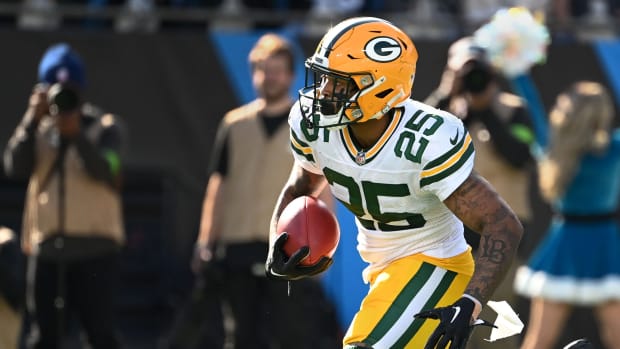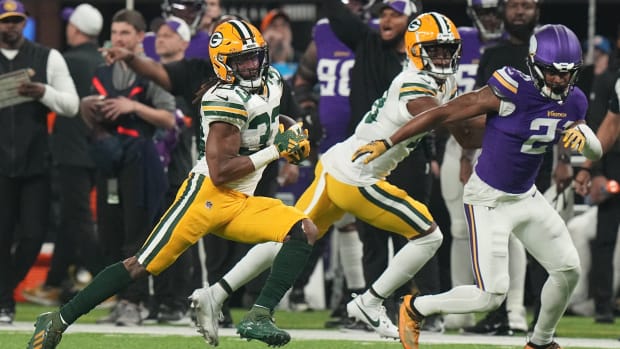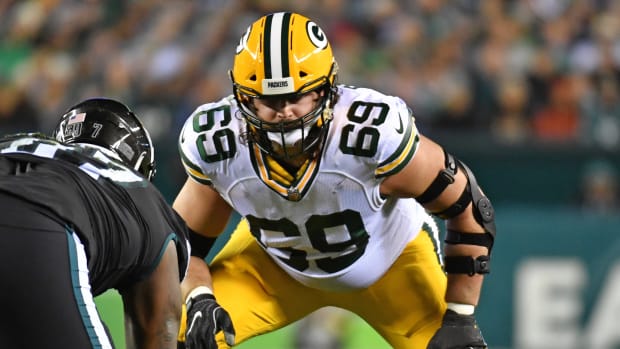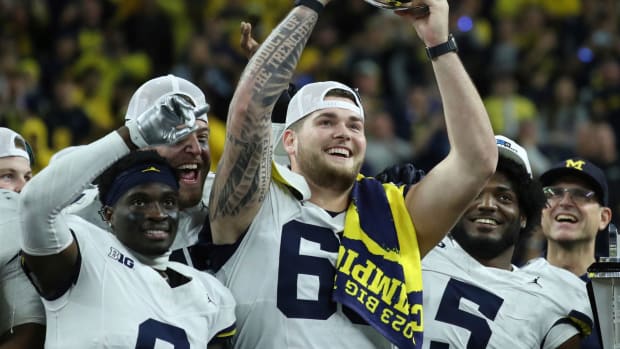Top Cornerbacks in NFL Draft: Best of the Rest
The Green Bay Packers have invested a lot of draft picks at cornerback over the years but could need someone to fill the slot.
No. 6: A.J. Terrell, Clemson (6-foot-1 1/8, 195; 4.42 40): Terrell had six interceptions in his career, including a career-high three as a sophomore. As a senior, he had two picks and three additional breakups to earn first-team all-ACC. According to Sports Info Solutions, he allowed a 48 percent catch rate and three touchdowns for a passer rating of 81.3. He allowed a troubling 7-of-13 on passes thrown 20-plus yards downfield. Plus, he missed 14 tackles for a missed-tackle rate of 29 percent, making him perhaps the worst tackler among this year’s corners. He excels in press coverage and is fluid for a big corner.
One of his interceptions in 2018 was a pick-six in the national championship game vs. Alabama. “My playing style, I would say I’m a competitor. I don’t like to back down from competition. I’m going to give the receiver my best and I know I’m going to get theirs. We’re just going to compete for the whole four quarters.” In the national championship game against LSU, he was matched against LSU’s Ja’Marr Chase and got his lunch handed to him, with the All-American receiver catching nine passes for 221 yards and two touchdowns. “Going out there on the biggest stage, we had a great game. I made a few plays early in the game and he made a few plays in the first half and we went back and forth throughout the whole game.” Athletics runs in the family, with two sisters competing in college track and field.
No. 7: Jeff Gladney, TCU (5-10 1/4, 191; 4.48 40): In four seasons, Gladney intercepted five passes, had 43 total passes defensed and had six tackles for losses. His 37 breakups ranked sixth among active players. He had two interceptions as a sophomore and junior. As a senior, he had one interception and broke up and additional 15 passes to earn some All-American honors. “I'm too competitive. I don't want nobody to beat me. I feel like I'm the best at everything.” According to Sports Info Solutions, he allowed a 38 percent catch rate, three touchdowns and a 74.4 passer rating. According to Pro Football Focus, he allowed 12-of-34 on passes thrown 10-plus yards downfield. His ball production and footwork rival that of any cornerback in the draft.
“I play bigger than my size,” he said at the Combine. “Most receivers don't know that. They think they're going to come out there and bully me, but that doesn't go down." He’s not a good tackler (six misses; 18 percent) due in part to his size but at least the mentality is there. “I just like sticking my nose in there and making a play, just helping. Most corners don't like showing up in the run game, but I do.” He was a nominee for the Senior CLASS Award due to his play on the field, academics and work in the community.
No. 8: Noah Igbinoghene, Auburn (5-10 3/8, 198; 4.47 40): Igbinoghene’s lone interception came as a sophomore, when he broke up 10 passes for a total of 11 passes defensed. As a junior in 2019, he broke up seven passes. He allowed a 43 percent catch rate, two touchdowns and 76.1 passer rating, according to SIS. He’s a playmaker, with a 27.3-yard average and two touchdowns on kickoff returns.
The 40 time was almost disappointing. Igbinoghene competed in the long jump and triple jump for Auburn’s indoor and outdoor track teams. His parents, Faith and Festus Igbinoghene, were Olympic track athletes for Nigeria. His mom, Faith, was part of the Nigerian women’s 400-meter that won bronze at the 1992 Summer Olympics. He played football, soccer and track growing up. Why football? “That’s the physical part of it. It’s the best sport to play, to me. It’s the most fun. I really enjoy playing it, I love it. I feel like I’ve found my calling doing this, moving form wide receiver to corner, just everything in my life—the reason I’m here is because of football, so everything’s been a blessing that’s come straight from the game of football. I’d be wrong to say football’s not my favorite.” He went to Auburn as a four-star receiver but left as a top cornerback prospect. “First, I was sitting at my barber, and I was kind of down because my freshman year didn’t go how I wanted to; every freshman wants to come in and play but I just played special teams. The competitor in me, that’s not all I wanted to do my freshman year. So, after my freshman season, I think I was in indoor track or something like that, and my barber said something to me about it — he used to play at Auburn — so that was the first person who said something to me about it. I wasn’t really thinking about it then. Then my pastor said something to me about it, and I said, ‘OK, this is kind of weird to me a little bit.’ Then actually I met with Coach (Kevin) Steele; I played special teams and punt return, and I was the (jammer), which is kind of corner for a punt return. He was down at the cornerback position, and he asked me to do it. I did it, and in six practices I was starting.” As you might expect, he’s not a finished product. Ideally, he’d have a year to learn the finer points of coverage skills. He’ll need a teacher as a coach. He missed nine tackles (18 percent) but has the right mentality.
No. 9: Bryce Hall, Virginia (6-1 1/4, 202; DNP 40): Hall had five interceptions and 38 additional breakups for a total of 43 passes defensed in four seasons. As a junior, he had a massive season with two interceptions and 22 additional breakups. His 24 total passes defensed led the nation as he earned second-team All-American. According to Sports Info Solutions, he dropped three interceptions, gave up three touchdowns and yielded a 54.5 rating in 2018. Hall considered entering the draft but came back for his senior season.
Hall had no interceptions and four breakups in six games in 2019 before a broken leg and dislocated ankle ended his season. Because of the injuries, he didn’t test at the Combine but hoped to be ready for training camp. “I have no regrets at all,” he said at the Combine. “When I look back at how the process went after the injury, I feel like it prepared something in me and did the work in me that, had I not been able to experience that, would never have been there. I feel like I’m at a whole other level in terms of where my mind-set is, the knowledge of the game that I have. My priorities just got purified. I feel like I grew as a leader.” Beyond the medicals, he lacks the long speed of Terrell, a corner with similar height.
Hall was a prolific receiver in high school but just a two-star recruit. Oddly, he dropped six interceptions in four seasons. He’s got 32 1/4-inch arms.
No. 10: Damon Arnette, Ohio State (5-11 5/8, 195; 4.56 40): Arnette had five interceptions in four seasons. As a senior, he had one interception – a 96-yard pick-six – and eight additional breakups. He was second-team all-Big Ten as a senior after honorable mentions the previous two seasons. He allowed a 38 percent catch rate with a 54.0 rating, according to SIS. According to PFF, he allowed just 8-of-25 on passes thrown 10-plus yards downfield. His 30-inch arms and 4.56 speed are two big dings. Teams that demand their corners to play run defense might look past his shortcomings.
Arnette left Ohio State last year with the intention of entering the draft but a change on the coaching staff and a conversation with former Ohio State and NFL star Cris Carter caused a change of heart. “I am more confident. I feel like I’m more technically sound. That dog in me that I had in me, that’s who I feel like I am now instead of being him sometimes. I am smarter and I’m more mature on and off the field. I feel like overall I’m just more ready now than I was last year. … I’ve never gotten arrested, I’ve never had an abuse charge or anything like that so character concerns, I feel like that word is just used real loosely when you really think of what character concerns really are.”
No. 11: Cameron Dantzler, Mississippi State (6-2 1/4, 188; 4.64 40): In three seasons, Dantzler had five interceptions and a total of 20 passes defensed. He had two interceptions and eight additional breakups in 2019. According to Sports Info Solutions, he dropped three interceptions; according to PFF, he allowed only 4-of-13 on passes 10-plus yards downfield. He was almost the only cornerback to have any success against LSU stud Ja’Marr Chase, helping hold him to five catches for 48 yards. “Just watching film on him. I knew it was going to be a big game for me. Just watching film made it easier for me, his technique, what he likes to do, the routes he likes to run, his leverage. Sometimes his leverage gave up the route.” His first career interception came against Lamar Jackson as a freshman and he picked off Joe Burrow this past season.
On the plus side, he missed only four tackles (11 percent) but he lacks the heft to play consistent run defense. “I’m not afraid to tackle. Most corners don’t like to come up and tackle. That’s something I try to critique in my game because most corners don’t like doing it so I’m trying to be different from any other corner in the draft.” However, Dantzler is tall but he’s not long (30 5/8-inch arms) and he’s not fast. That 40 time could take him off some teams’ boards entirely. “I feel I have all of those utensils to play corner. There’s always room for improvement. I feel like I can improve on some, like at the line of scrimmage, using my hands more. You watch film, I run with most of the fastest receivers, so speed is not a thing for me. I just have to gain more strength and I feel like I’ve gotten a lot stronger.”
At St. Thomas High School in Hammond, La., Dantzler was a dual-threat quarterback and state champion in the long jump. His game was sharpened by his position coach, Terrell Buckley.
No. 12: Michael Ojemudia, Iowa (6-0 1/8, 205; 4.48 40): Ojemudia was a full-time starter for the first time as a senior, when he earned second-team all-Big Ten with three interceptions and nine additional breakups for 12 passes defensed. According to SIS, he allowed a 52 percent catch rate and 51.4 passer rating. He allowed just 8-of-33 on passes 10-plus yards downfield, according to PFF. He also intercepted three passes as a part-time starter as a junior. His 32 1/4-inch arms and fast 40 are weapons. Plus, he missed only three tackles (5 percent). Coaches will appreciate his run defense.
As a fellow two-star recruit, he tried to follow in the footsteps of Josh Jackson, who wound up being a second-round pick by the Packers. “(Jackson) was in my shoes,” Ojemudia told the school athletics site. “I feel like if I prepare like him and prepare to be my best every game, I can do well during the season.” He majored in mechanical engineering in hopes of working for a car company, just like his father. “On bring your kid to work day, I used to go over there (Ford),” Ojemudia told the Athletic. “They used to do the crash tests and stuff like that. So that’s what basically got me eager for that industry at an early age. Just my dad bringing me there. That’s basically my biggest inspiration for becoming an engineer. (My dad is) an engineer at Ford. So that’s where I got my passion for engineering.” At Farmington Hills (Mich.) High School, he played tight end and linebacker and was all-state in the 110 hurdles.
No. 13: Reggie Robinson II, Tulsa (6-0 7/8, 205; 4.44 40): After being limited to eight games by a broken arm and injured hamstring as a junior, Robinson led the American Athletic Conference with 17 passes defensed (four interceptions, 13 breakups) to earn first-team all-conference accolades. Those were all of his career interceptions. According to SIS, he allowed a 45 percent catch rate and 45.4 passer rating. According to PFF, he allowed 13-of-30 on passes thrown 10-plus yards downfield. “I’m an aggressive, in-your-face man type of a corner, but I can play any type of coverage,” he said at the Combine. “My coach really liked playing man press because we had some big corners. That’s what we did.”
He became the first Tulsa defensive back in almost 50 years to get a Senior Bowl invite. He was a late addition to the Senior Bowl as well as the Scouting Combine. “Oh, man, it’s great. It’s like something just starts clicking and when it starts going, you feel good about it. After the NFLPA and the Senior Bowl, I just felt like everything was on a roll and then I got the Combine invite, so I feel pretty good.” He had a quietly great Combine with the fast 40, 36-inch vertical and 22 reps on the bench press. His physical tools, ball skills and special-teams acumen (four blocked kicks in his career) make him a highly underrated prospect. There are major flaws in his game, though, starting with five pass-interference penalties in 2019.
No. 14: Troy Pride, Notre Dame (5-11 1/2, 193; 4.40 40): Hand had four interceptions in four seasons, including two picks and 10 additional breakups as a junior and one pick and six additional breakups as a senior. According to SIS, he allowed a 46 percent completion rate but four touchdowns for a rating of 84.0. According to PFF, he allowed just 2-of-14 on passes 20-plus yards downfield. He missed five tackles (12 percent) and is a decent run defender. “Fierce competitor,” he said at the Combine. “I would say that first and foremost. I'm going to do everything I can to be the best at everything I do. With that, you can only get near greatness when you do that. So, I'm going to compete in everything I do and I'm going to win.”
Pride and his family survive a serious car accident in June after an RV clipped their car and sent it over a guardrail. “If you see the car, you will understand why I give God the glory,” Tony Pride Sr. told the Indy Star. “It’s a testimony and it’s a blessing. It could have been worse — a lot worse.” Pride was part of the track team in 2018; he competed in the 60- and 200-meter sprints at the ACC indoor championships. Pride was a football player running track and not a track guy playing football. “There’s an idea that track guys aren’t physical enough or they don’t have the lateral movement, but when it gets down to it, what are you doing to change that on the field,” Pride told GoUpState.com. “You can’t listen to everything people say. I’m a football player first that can run track when it comes time to.” That he allowed four touchdowns is troubling for a cornerback who should have quarterbacks scared to throw his way.
No. 15: L’Jarius Sneed, Louisiana Tech (6-0 1/2, 192; 4.37 40): Sneed closed his career with back-to-back seasons of three interceptions. As a junior, he added eight breakups for 11 total passes defensed. As a senior, he added six breakups (two of which were dropped interceptions) for nine total passes defensed along with a career-high 73 tackles to earn second-team all-conference. According to Sports Info Solutions, he allowed just a 38 percent completion rate and 26.0 passer rating. He missed 16 tackles (10 percent).
Sneed spent his first three seasons at cornerback before moving to safety. He was apprehensive about the move, considering it was his final year in school, but got some advice from a former Tech star. “I talked to (Green Bay Packers defensive back) Tramon Williams. He gave me knowledge about it, like that's what made me (make) my decision. He was like 'yeah, I think you should,' because the scouts will look at me like he played corner this year, now he's playing safety this year. Like I can play man coverage and I can play in the backfield at safety so I feel like it's a good move.” He split his snaps in 2019 between safety and the slot. With his size and speed, he’s certainly worth a try at cornerback before going back to safety.
He had eight career interceptions, including three returned for touchdowns. The playmaking skill showed in high school, when he scored 19 touchdowns as a senior. A brother, T.Q. Mims, played quarterback at Arkansas Pine-Bluff.
No. 16: Harrison Hand, Temple (5-11 1/8, 197; 4.52 40): Hand spent his first two seasons at Baylor before the New Jersey native transferred to Temple for his final season. “I had a lot of family issues going on back at home,” Hand said at the Combine. “And one of my position coaches (at Baylor) was Fran Brown. He went back to Temple at about the same time. I was up in the air about it. But the fact that he was going back home too kind of put me over the top.” The NCAA gave him a hardship waiver so he could play immediately. He had career highs of three interceptions (and dropped two others) and four tackles for losses in 2019; he added five additional breakups. According to SIS, he allowed a 47 percent completion rate and two touchdowns for a 54.6 passer rating. Hand had four interceptions in three seasons. The ball production is disappointing and speaks to the lack of explosion in his game.
He takes pride in his tackling, dating to his time at Baylor with Brown. “He’d work with me before practice, after practice, before games,” Hand said. “He’d grab a linebacker and we’d go head to head and collide. Definitely made me a great hitter.” According to SIS, he missed 13 tackles (15 percent).
No. 17: John Reid, Penn State (5-10 3/8, 187; 4.49 40): Reid was an honorable mention on the all-Big Ten team following each of his final three seasons. As a senior, he had two interceptions and eight breakups for a total of 10 passes defensed. According to Sports Info Solutions, he allowed a 54 percent completion rate, two touchdowns and a 73.6 rating. He dropped two interceptions. According to PFF, he allowed 5-of-11 on passes thrown 20-plus yards downfield. He missed 10 tackles (14 percent) and looks like a potential fit in the slot.
He missed the entire 2017 season with a knee injury and rounded back into form in 2019. He is a data science major who interned at Dell. “It’s just like anything: You put the time into it, and then it all ends up working out if you work hard enough,” he said at Big Ten Media Days. “It’s kind of the approach I took. With football, I’m just used to putting in a ton of hours to do stuff. If I want to be good at something, I want to be good at it, period. I don’t expect anything less, so I kind of put the time in. I wouldn’t call it sacrifice. Usually when you think of sacrifice, it almost gets a bad vibe to it. I think it’s necessary. It’s something that I wanted to do. I’m going to make it a priority.”
No. 18: Lamar Jackson, Nebraska (6-2, 208; 4.58 40): A three-year starter, Jackson had two interceptions as a junior and career highs of three interceptions and 12 additional breakups for 15 passes defensed as a senior. According to SIS, he allowed a 38 percent catch rate and 47.4 passer rating. He allowed only 3-of-15 on passes thrown 20-plus yards downfield.
His path to the NFL wasn’t easy. With his father in prison, football would be the salvation for the 5-year-old. But he didn’t love football and certainly didn’t want to move from quarterback in college. As Omaha.com put it, “Over the past three years, he’s been broken, beaten, bulldozed and bruised. Embarrassed on national TV, threatened online, called out by coaches in press conferences.” It took Jackson accepting some humble pie to turn the corner on his career. “What do you do? You think. You cry. You sit there. You stomach it. By yourself,” Jackson said. “I’m sitting in my dorm room just crying. Like, they told me I was gonna be the man. They told me I was gonna start. I’m out here getting beat. Left and right. Getting pushed on my ass. I’m hurting. But I’m legendary? I thought I was legendary. So it’s f------ me up.” His height and length (32 1/4-inch arms) make him an appealing prospect but his past troubles, spotty run defense and poor tackling (11 misses; 21 percent) bump him way down the board.
No. 19: Dane Jackson, Pittsburgh (5-11 5/8, 187; 4.57 40): Among active players, the three-year starter was fourth in the nation with 39 passes breakups. Two of his four interceptions came as a sophomore. He had zero picks, 14 breakups and four forced fumbles as a junior and one pick and 12 additional breakups as a senior, when he was second-team all-ACC. He allowed a 40 percent completion rate but five touchdowns and was slapped with six pass-interference penalties, according to SIS. On the other hand, according to PFF, he allowed 0-for-9 on passes thrown 20-plus yards downfield. The ball skills and aggression (if properly harnessed) are great; you’d like to see that aggression when it comes to run support and tackling (eight misses; 16 percent).
Jackson was lightly recruited, getting offers from only Bowling Green, Eastern Michigan, Duquesne and Indiana State until Pitt offered at the end of a camp. At tiny Cornell High School in Coraopolis, Pa., “Action Jackson” was a rare two-sport star – an eight-man list that included Darrelle Revis and Bruce Gradkowski.
No. 20: Thakarius Keyes, Tulane (6-0 7/8, 202; DNP 40): Keyes had one interception and nine breakups as a junior and one interception and four breakups as a senior, giving him two picks and 17 total passes defensed in four seasons. According to SIS, he allowed a 46 percent completion rate and two touchdowns for a 68.7 rating. He’s a dreadful tackler, with 13 misses and a missed-tackle rate of 22 percent. Despite the tackling issues, he’ll battle in run defense.
At Laurel (Miss.) High School, he was a basketball standout who didn’t start playing football until his junior year. Because he started football so late, he didn’t receive a single scholarship offer. He planned on going to junior college but, instead, decided to bide his time. Finally, Tulane offered. He’s got 32 5/8-inch arms, tied with Ohio State’s Jeff Okudah for third-longest in the class. “It definitely helps set the line when you can play off a little bit, like a yard off, and be able to reach at any moment and deflect the ball, even when you can't pick the ball,” he said at the Combine. “It helps a lot when I'm going up in the air to catch the ball, even if I jump early, my arms are so long that I can get a PBU even though I can't get the pick.”
Bill Huber’s Cornerback Profiles
No. 1: Ohio State’s Jeff Okudah




